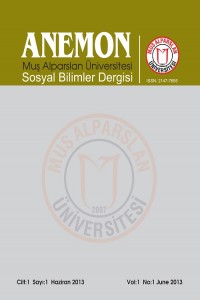Abstract
It cannot be denied that the Arab Spring has started a very important transformation process in the Middle East but it is very difficult to expect that this transformation will lead to a democratic change within a very short period of time and contribute to a democratic development in the sense of Western experience. Transition from oppressive and authoritarian regimes to a democratic regime does not take place in a short period of time through uprising and revolution. Democracy is a phenomenon that requires possession of democratic culture and tolerance rather than accepting it as a regime. Besides, the ethnic and religious structure of the countries taking part in Arab Spring is different from each other. In some of those countries, ethnic and religious demands come before the desire for democracy and democratic aspirations. For instance, the Kurds in Syria, who do not have even identity cards and have not been considered as citizens until recently, demand the recognition of the Kurds as a national entity and their participation to Syria government, while Sunni Muslims in Syria essentially want to put an end to the Shiite dictatorship and to establish a majority regime under their rule. On the other hand, the major fear of Syrian Christians is that the Sunni majority government which will be potentially established after the collapse of Assad regime will not recognize their basic rights. In this paper we will focus on different and contradicting demands of Kurds, Christians, Sunni and Shiite Muslims in Syria
Keywords
Abstract
Arap Baharı’nın Ortadoğu’da çok önemli bir değişim sürecini başlattığı inkâr edilemez. Ancak bu değişimin kısa bir süre içinde demokratik bir dönüşüme yol açması ve Batılı anlamda demokrasilerin gelişmesine katkı sağlamasını beklemek oldukça zordur. Baskıcı ve totaliter rejimlerden demokratik rejimlere geçiş, bir ayaklanma veya bir devrimle kısa bir süre içinde olabilecek bir durum değil. Demokrasi, bir rejimin kabullenmesinden ziyade demokratik bir kültüre sahip olmayı gerektiren bir olgudur. Ayrıca Arap Baharı zincirine dâhil olan ülkelerin etnik ve dini yapılanmaları birbirinden çok farklıdır. Kimi ülkelerde etnik ve dini talepler, demokrasi ve demokratik taleplerden önce gelmektedir. Örneğin Suriye’de, daha yakın zamana kadar kimliği bile olmayıp vatandaş kategorisinde yer almayan Kürtlerin en önemli önceliği ulusal varlıklarının tanınması ve yönetimde pay sahibi olmak iken, Sünnilerin temel amacı Şii diktatörlüğe son verip kendilerinin yönetimde olacağı bir çoğunluk rejiminin kurulmasıdır. Suriye’deki Hıristiyanların en büyük korkusu Esat rejiminin yıkılmasının ardında iktidarı devralacak Sünni çoğunluğun Hıristiyan azınlığa yaşam tanımamasıdır. Çünkü bizler her çoğunluk rejiminin demokratik bir rejim olmadığını çok iyi biliyoruz.
Keywords
Details
| Primary Language | Turkish |
|---|---|
| Journal Section | Research Article |
| Authors | |
| Publication Date | March 16, 2015 |
| Published in Issue | Year 2013 Volume: 1 Issue: 1 |

